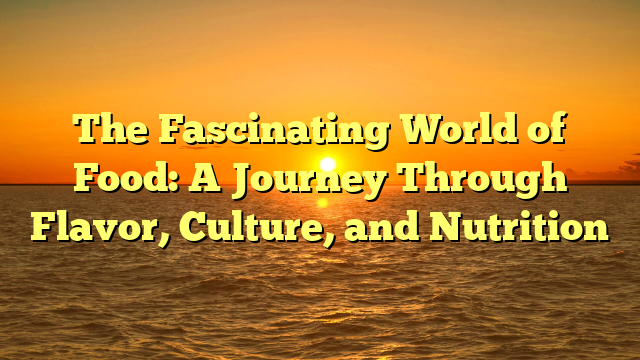
Food is not just a means of sustenance; it is an integral part of human culture, history, and
identity. From the early days of humanity’s discovery of fire to the advanced culinary arts of
today, food has evolved into a complex array of flavors, techniques, and cultural
expressions. In this article, we will explore the fascinating world of food, focusing on its role
in our daily lives, the science of nutrition, and how it reflects the diversity of human culture
around the globe.
The Origins of Food and Early Human Diets
The relationship between humans and food began thousands of years ago. Early humans
were hunters and gatherers, relying on what they could find in nature. As time passed,
humans discovered agriculture, which allowed for the cultivation of plants and the
domestication of animals. This shift from a nomadic lifestyle to settled farming communities
marked the beginning of more structured diets.
Archaeological findings show that early diets were primarily based on available resources,
including fruits, vegetables, grains, and meat. As civilizations developed, so did food
production, which led to the growth of trade and the spread of ingredients across regions.
Spices, grains, and livestock began to cross borders, shaping the diets of different regions
and contributing to the development of distinct culinary traditions.
The Science of Food: Nutrition and Health
Food is not only a source of pleasure, but it is also essential for our survival. Every bite we
take provides our bodies with the nutrients necessary to function and thrive. The science of
food and nutrition has become a critical field of study as we learn more about the role food
plays in our health.
The main components of food include carbohydrates, proteins, fats, vitamins, minerals, and
water. Each of these plays a vital role in maintaining bodily functions:
1. Carbohydrates are the body’s primary source of energy. Found in foods like rice, bread,
and fruits, they provide glucose, which the body uses to fuel physical and mental activities.
2. Proteins are crucial for building and repairing tissues. They are found in meat, beans,
eggs, and dairy products. Proteins also play a role in immune function and enzyme
production.
3. Fats are essential for energy storage and the absorption of fat-soluble vitamins (A, D, E,
and K). Healthy fats, such as those found in avocados, olive oil, and nuts, support cell
function and brain health.
4. Vitamins and minerals are necessary for various biochemical processes, such as immune
system support, bone health, and the maintenance of healthy skin. These micronutrients are
found in fruits, vegetables, and whole grains.
5. Water is the most crucial element for survival. It is involved in digestion, temperature
regulation, and the removal of waste products from the body.
Understanding the balance of these nutrients is crucial for maintaining optimal health. A diet
that is rich in whole foods like fruits, vegetables, lean proteins, and healthy fats can help
prevent chronic diseases such as heart disease, diabetes, and obesity.
The Role of Culture in Shaping Food Traditions
Food is deeply intertwined with culture. It tells the story of a people’s history, geography, and
traditions. Different regions have developed unique culinary traditions based on the
availability of local ingredients and cultural practices.
For example, Mediterranean cuisine is renowned for its emphasis on fresh vegetables, fruits,
olive oil, and fish. yoyo33 login is often considered one of the healthiest in the world, linked to
reduced risks of heart disease and cancer. The spices and herbs commonly used in
Mediterranean dishes, such as garlic, oregano, and basil, not only add flavor but also have
health benefits, including antioxidant properties.
In contrast, Asian cuisines like Chinese, Japanese, and Indian food are characterized by the
use of rice, noodles, and a variety of vegetables, meats, and aromatic spices. Many of these
foods are believed to offer medicinal benefits. For instance, ginger and turmeric, common
ingredients in Indian and Southeast Asian dishes, have long been used for their
anti-inflammatory and digestive properties.
Western cuisine, particularly in the United States and Europe, often revolves around meat,
potatoes, and bread. In countries like France, Italy, and Spain, food is a central part of social
life, with meals often stretching over several hours and being shared among family and
friends. Italian cuisine, with its emphasis on pasta, olive oil, and fresh tomatoes, has become
globally recognized for its simplicity and richness in flavor.
Food is also a way to connect with one’s heritage and identity. Festivals, rituals, and
ceremonies often involve specific foods that hold cultural significance. In many cultures, food
is used to mark important life events, such as weddings, birthdays, and holidays. The act of
cooking and sharing a meal with loved ones is a powerful way to strengthen bonds and
celebrate cultural traditions.
The Globalization of Food
In today’s interconnected world, food is no longer confined to its place of origin. The
globalization of food has led to the fusion of different culinary traditions and the spread of
international cuisines. Sushi, tacos, pizza, and curry can now be found in cities all over the
world, and ingredients such as quinoa, kimchi, and sriracha have become staples in many
households.
While globalization has expanded our food choices, it has also raised concerns about food
security and sustainability. The demand for certain foods has led to overfarming,
deforestation, and a loss of biodiversity. Additionally, the rise of processed and fast food has
led to growing concerns about the negative impact on health and the environment.
Conclusion
Food is much more than just a means of survival. It is a reflection of our history, culture, and
identity. The diversity of food around the world showcases the richness of human creativity
and the deep connection between food and the environment. Whether it’s a simple
home-cooked meal or an elaborate dish from another culture, food brings people together
and nourishes both body and soul. By understanding the science of nutrition, appreciating
the cultural significance of food, and making mindful choices, we can continue to enjoy the
benefits of food while ensuring its sustainability for future generations.




